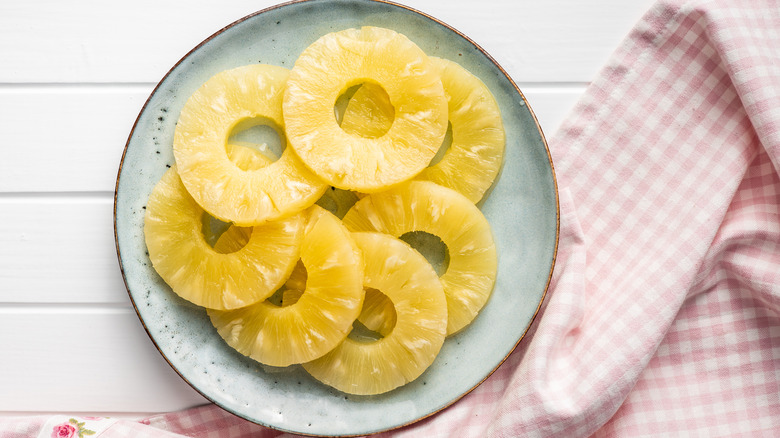Is Canned Fruit Good For You?
We've all heard the old adage "An apple a day keeps the doctor away," but does that remain true if the apples are pre-sliced and canned? Canned fruit often gets a bad wrap, with many people believing that when it comes to fruit, if it's not fresh, it must be devoid of nutritional value and loaded with unhealthy added sugars. This has led some to steer clear of the canned fruit aisle, while others remain steadfast that canned fruit has its place in a healthy diet.
Developed in the early 1700s to ensure soldiers and sailors had provisions during times of war, canning is a method of preserving foodstuffs by sealing them in airtight containers (per Healthline). While the process may vary depending on the product, canning will inevitably include three steps. First, the food undergoes processing in which it is peeled, sliced, chopped, pitted, boned, shelled, or cooked before it is sealed in cans. Once the cans are sealed, they are then heated to kill any bacteria that might cause the food to spoil, making the food stable for one to five years, or even longer. With such an impressive shelf-life, canned fruit makes an appealing case against fresh fruit, which is often only good for days or weeks before turning. But when you opt for canned fruit, are you forfeiting health for convenience?
Is eating canned fruit a healthy option?
According to the 2020-2025 Dietary Guidelines for Americans produced by the U.S. Department of Health and Human Services, we should be eating two cups of fruit a day in order to maintain a healthy diet. However, a 2019 report released by the Centers for Disease Control and Prevention suggested that only 12% of adults were meeting the minimum threshold for fruit and vegetable intake, meaning that the vast majority of us are falling short. Luckily, a 2020 article published in Nutrition Today reported that when it comes to canned, frozen, and fresh fruits, all three retain similar levels of nutrients and can be used to help people reach their recommended fruit intake.
Of course, as is true with most things, it's important to read the fine print. Canned fruits packed in water or their own juices are going to be much healthier than those submerged in high calorie syrups, so it's important to read the label to know what you're getting (per Livestrong). Another thing to take into consideration is who's canning your fruit. Insider reported in 2020 that 10% of canned goods still contain BPA in their packaging, a chemical substance used in container manufacturing that has a long history of seeping into our canned foods. While the U.S. Food and Drug Administration has reported that BPA exposure shouldn't cause humans harm at low levels, you can avoid BPA altogether by choosing companies that don't use it in their packaging, if you so choose.
Added benefits of canned fruit
Boasting nutritional value comparable to their fresh and frozen counterparts isn't the only thing canned fruits have going for them. In fact, from an economic standpoint, canned fruit might offer some benefits that fresh fruit cannot. In many parts of the country and the world, fresh fruit isn't always easily accessible or affordable. That's where canned fruit comes in.
A fact sheet produced by the Canned Food Alliance reports that lower-income families account for one-third of the total canned food consumption and that many rely on canned goods as a way to get important nutrients. According to the Food Bank of Western Massachusetts, canned food is a cost-effective way to add a variety of fruits and vegetables to your diet, and with 15-20% of fresh produce being thrown away each year, buying canned goods can help minimize wasted food and money.



